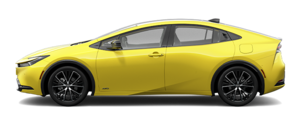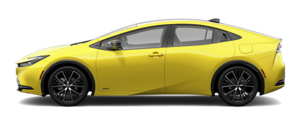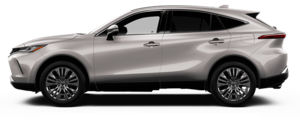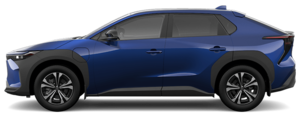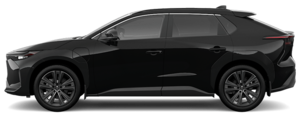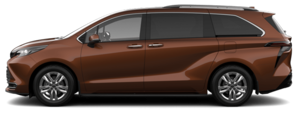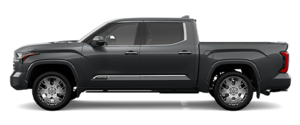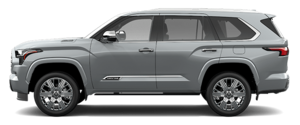Toyota Hybrid Cars and SUVs
Combining performance, design, reliability and model diversity, there have never been more advantages to choosing a Toyota hybrid vehicle than today.
How It Works
Toyota's hybrid vehicles combine an electric and a gasoline system. The two are combined automatically, without driver intervention. The hybrid engine reduces emissions by 70% compared to conventional gasoline vehicles, without compromising performance.
Why Choose a Toyota Hybrid Vehicle
Power, performance, and reliability are the hallmarks of Toyota's no-compromise hybrids. The hybrid battery in a Toyota hybrid requires no hook-up and recharges itself while driving. And no additional maintenance is required for a hybrid engine.
Toyota led the automotive industry down the road to electrification in 1997 with the Prius' introduction and continued to innovate for a more efficient, sustainable and inspiring future. Toyota's hybrid vehicles reduce your carbon footprint without changing your driving habits. With all these benefits and a wide range of model choices, why not go hybrid?
How Toyota Plug-In Hybrid Vehicles Work
Toyota offers a range of Plug-In Hybrid Vehicles (PHEV), such as the Prius Prime. These models can be plugged in to extend their range in electric mode. They essentially work like regular hybrids, but give you an added advantage: PHEVs can run much longer in 100% electric mode!
Simple and Efficient Charging
One of the advantages of Prius Prime is the reduced charging time. Without even needing additional equipment, this model has one of the fastest charging times in its class!
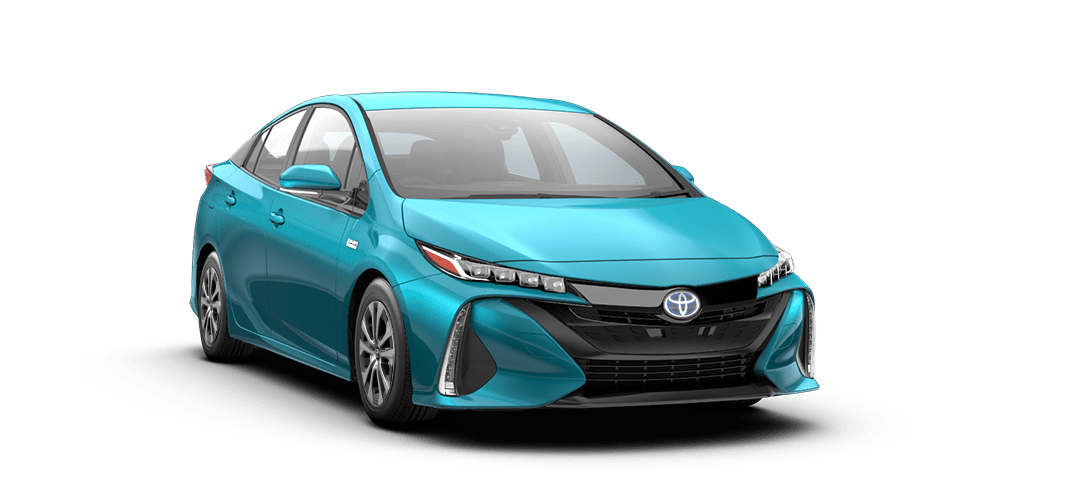
Learn More
Starting Up
In most conditions, when the vehicle starts up, only the electric motor is engaged, which saves fuel and delivers instant torque.
Accelerating and Cruising
While driving, the electric and gas motors are used in symbiosis, providing the perfect mix of power without compromising performance. The excess energy is used towards recharging the electric battery.
Decelerating and Braking
During deceleration and braking, the electric motor takes over completely. The regenerative braking system converts kinetic energy into electric energy to recharge the battery.
Resting and Reversing
When the vehicle is stopped, the gas engine shuts down, making room for the electric motor, unless the battery's autonomy is low. This allows you to save on fuel. When reversing at low speed, the hybrid vehicle only uses the electric motor.
Why Choose a Hybrid Vehicle?
Toyota offers the most diverse hybrid lineup on the market with vehicles for every need and taste. Toyota's hybrid vehicles offer several advantages that combine performance, reduced CO2 emissions and safety.
Don't compromise on performance with Toyota hybrids. Get similar performance - and sometimes even better - than equivalent gasoline-powered vehicles.
With Toyota hybrids, you can keep your driving habits the same. The Hybrid Synergy Drive system works seamlessly and doesn't require you to adapt. You'll be able to hit the road just as you did in the past!
There's no need to plug in Toyota hybrid vehicles. Their Hybrid Synergy Drive system recharges automatically as you drive.
Toyota hybrid vehicles follow the same regular maintenance schedule as other gasoline vehicles. So there's no need to pay extra for maintenance.
Some plug-in hybrid electric vehicles (PHEVs) can be plugged in to offer extended range. The Prius Prime, for example, has a total range of 1,035 km* on a full tank and a full charge.
Since their introduction in 1997, Toyota hybrid vehicles have avoided the emission of more than 94 million tons of CO2 worldwide.
Join the movement for sustainable transportation by choosing Toyota hybrid vehicles. The manufacturer's goal is to promote the environment by reducing emissions from its new vehicles by 90% by 2050, compared to 2010 levels.
When the time comes, the batteries in our hybrid vehicles are recycled or repurposed for a different use, just like other types of batteries.
Safety is our priority and hybrid vehicles are no exception. All vehicles are tested for life in the Canadian climate and follow the Canada Motor Vehicle Safety Standards. Plus, the Toyota Safety Sense active safety suite is included with all our hybrid vehicles.
To ensure that Toyota hybrid vehicles perform well in all climates, they have been subjected to rigorous cold weather testing. They were designed with Canadian winter temperatures in mind.
The batteries of Toyota hybrid vehicles are designed to last and are covered by an 8-year or 160,000 km warranty, like all hybrid vehicle components. In fact, for more than 98% of Toyota hybrid vehicles sold since 2001, the battery has never been replaced.
Find the Right Hybrid Vehicle for You
at Accès Toyota
Discover Toyota's wide range of hybrids for every need and driving style. From subcompacts to sedans and SUVs, Toyota has a model for everyone.
* Freight & Fees Included
* Freight & Fees Included
* Freight & Fees Included
* Freight & Fees Included
* Freight & Fees Included
* Freight & Fees Included
* Freight & Fees Included
* Freight & Fees Included
* Freight & Fees Included
* Freight & Fees Included
* Freight & Fees Included
* Freight & Fees Included
* Freight & Fees Included


* Freight & Fees Included
* Freight & Fees Included
* Freight & Fees Included
* Freight & Fees Included
* Freight & Fees Included
* Freight & Fees Included
* Freight & Fees Included
* Freight & Fees Included
* Freight & Fees Included
* Freight & Fees Included
* Freight & Fees Included
* Freight & Fees Included
* Freight & Fees Included
* Freight & Fees Included
* Freight & Fees Included
* Freight & Fees Included
* Freight & Fees Included
* Calculated price is based on the manufacturer's suggested retail price. Shipping and preparation included, taxes extra. The rebate and purchase price displayed may vary depending on whether the vehicle is leased, financed, or paid in cash. While every reasonable effort is made to ensure the accuracy of this information, we are not responsible for any errors or omissions contained on these pages. Prices, payments and rates are subject to change without notice, please verify all information and pricing with a sales representative or ask online.
More Toyota Hybrid Facts
Disclaimer - Unless otherwise stated in an individual fact, all comparisons are between a Toyota Hybrid Synergy Drive vehicle and a conventional gasoline engine vehicle (comparable in size, class, equipment) when identically driven under identical conditions.
-
How long do hybrid batteries last?
The original hybrid battery of more than 98% of hybrid Toyota vehicles sold in Canada since 2001 has not yet been changed. All hybrid components, such as the battery, are covered by a warranty of 8 years or 160,000 km*.
*Whichever comes first
-
What are the advantages of a Toyota hybrid vehicle in the city and on the road?
Hybrid vehicles offer the engine-shut-off feature as well as an extended electric range in the city. The latest generation Toyota hybrids also offer a highly efficient gas engine. On the highway, the hybrid system can also enter EV mode by itself. Toyota's hybrid system can analyze and determine the optimal combination of gas and electric based on your driving conditions.
-
Will my driving and fueling habits change with a Toyota hybrid vehicle?
As hybrid vehicles are driven just like conventional gas vehicles, your driving and fuelling habits will remain unchanged. The hybrid system works seamlessly in the background and determines the optimal gas/electric combination by itself. You can fuel your hybrid vehicle just like you would with a gas-powered vehicle.
Plug-in hybrid vehicles (PHEV) offer all the benefits of a hybrid vehicle, but can also be plugged in to extend the electric autonomy of the vehicle.
-
Is the performance of a hybrid vehicle comparable to that of a gas-fuelled Toyota vehicle?
The performances offered by hybrid vehicles are similar - or sometimes even greater - to those of their gas counterparts. The instant torque of the electric motor allows the hybrid vehicle to accelerate off the line as well as a refined and direct acceleration.
Electric motors can also improve the total horsepower. The RAV4 Hybrid, for example, has more horsepower and faster acceleration than the gas-fueled RAV4. This extra power allows for the conception of smaller and lighter engines, which improves handling.
-
Do Toyota hybrids require additional maintenance?
No additional maintenance is required for hybrid vehicles versus conventional gas-powered models. The same maintenance schedule is followed, with appointments every 6 months or 8,000 km.
The hybrid system can even reduce the frequency of maintenance for other components such as the gas engine, which is off at times. The brake pads and rotor also have a longer lifespan, as the brakes are regenerative. Hybrid vehicles also do not have transmission fluid, starters, alternators, or belts to replace.
-
Are Toyota hybrids as safe as a conventionally powered vehicle?
There's no need to be concerned with safety in hybrid vehicles, as they follow the rigorous Canada Motor Vehicle Safety Standards. Toyota hybrids are as safe as gas-powered vehicles.
The hybrid batteries, for example, are sealed in a protective metal case and insulated from the rest of the vehicle body. As for the battery cables, they are shrouded in bright orange cladding to be more visible to emergency workers. Toyota also collaborates with first responders to provide all necessary information concerning hybrid vehicles.
Toyota hybrids are always equipped with our suite of active safety technologies, Toyota Safety Sense. Hit the road with complete peace of mind!
-
How do hybrid vehicles promote a more sustainable future?
Hybrid systems offer a range of benefits in terms of performance, safety and reliability, but also in terms of CO2 emissions reduction. This positive environmental impact is even greater considering that gas engines are more energy-efficient today.
Since the launch of the Prius in 1997, Toyota's hybrid vehicles have saved over 94 million tons of CO2 emissions globally*.
* In lieu of conventional gasoline vehicles of similar class and engine performance
-
How long have Toyota hybrids been available?
Toyota launched its first hybrid vehicle, the Prius, in 1997. Since then, the hybrid lineup has considerably improved with innovations and improvements in hybrid technology. Today, 12 million hybrid vehicle sales later, Toyota offers a vast selection of hybrid vehicles among the full-line passenger vehicle manufacturers.
-
What warranties cover a Toyota hybrid vehicle?
Toyota hybrid vehicles are covered with a 3-year or 60,000 km Basic Complete Vehicle Warranty. Moreover, all the hybrid components, such as the hybrid battery, are covered by an 8-year or 160,000 km warranty.
*Whichever comes first
-
Are Toyota hybrid batteries recyclable?
Up to this day, around 98% of hybrid Toyota vehicles sold since 2001 still have their original battery. But, hybrid batteries can be recycled or repurposed when the time comes, just like any other battery. Toyota Canada has a recycling program for hybrid batteries and initiatives, like the Lamar Buffalo Ranch Project in Yellowstone National Park, to repurpose these batteries for a more sustainable future.
-
Do Toyota hybrids need to be plugged in?
The hybrid system in Toyota hybrids can recharge itself. Hybrid vehicles, therefore, do not need to be plugged in. Driving and fuelling are the same for hybrid and gas-powered vehicles!
As for plug-in hybrid vehicles (PHEVs), they can be plugged in to extend the electric-only range. Pure electric vehicles (EVs) need to be plugged in to recharge their battery as they do not have a gas-powered engine.
-
How do Toyota hybrids perform in different weather conditions including winter?
All Toyota vehicles, including Toyota hybrids, are rigorously tested to ensure their performance in different types of weather such as the harsh Canadian winters.
Hybrid Toyota vehicles are designed and optimized for winter. The RAV4 Hybrid is also built in Canada, by Canadians and for Canadians*.
* From 19MY onwards










